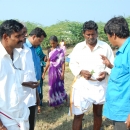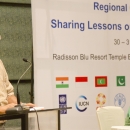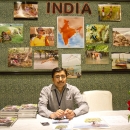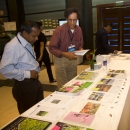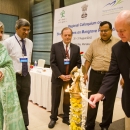Sharing Lessons on Mangrove Restoration - MFF Regional Colloquium
Location: Mamallapuram, near Chennai (Tamil Nadu), India. 30th Aug 2012 to 31st Aug 2012

The colloquium was an opportunity to examine the available scientific information and knowledge on mangrove restoration and to debate contrasting viewpoints and to identify sustainable solutions to complex conservation challenges stemming from the diversity of ideas and perceptions among different resource users and interest groups pertaining to mangrove ecosystems; address the inadequacy of meaningful information and to seek sustainable solutions to the complex problems currently encountered, not only from science, academia, lobby groups, industries and governments representatives, but also through a society-wide dialogue.
The colloquium was structured on presentations from MFF member countries and other countries in the Asia Region on their experiences from mangrove projects, particularly in relation to the improvements to coastal ecosystems and livelihoods of people, with a special reference to ecosystem services provided by mangrove ecosystems information for building knowledge on the economic significance of mangroves.
Some of the pertinent questions that were examined include:
- The economic and financial values of mangroves, and the need for restoration;
- New planting and restoration – the basic tenets including geo-morphological context of coastal ecosystems, interest in mangroves, impacts of mangroves in their natural state and planted (or cultivated) state, impacts of mangroves on other economic activities/sectors such as fisheries, agriculture, tourism, biodiversity, hazard mitigation, and urban planning (in terms of flood protection and drainage);
- Demonstration of benefits of mangrove restoration activities, and examination of and intended or unintended harmful effects of such activities on the ecosystem;
- Mangrove planting based on simplistic thinking and insensitive to physical geography, to geomorphology and the complexity of ecosystem structure and functioning;
- The need for accommodating the collective voice from primary resource users of mangrove ecosystems in mangrove projects;
- Guidelines for good practices, monitoring indicators, and accountability mechanisms; and
- Examination of the predictable relationships between mangroves and impacts of climate change, specifically in regard to protection from coastal hazards (e.g. cyclones, erosion, floods, in their role as bio-shields, etc) and food security (e.g. drainage, soil salinization, water-logging, etc).
|
Presenter |
Paper Title |
|||||
| K Kathiresan (India) | Valuation, carbon sequestration and restoration of mangrove ecosystems in India | |||||
| S Sukardjo (Indonesia) |
Indonesian mangroves: critical challenges and strategies for their sustainable management after the 26 December Tsunami |
|||||
| S Memon (Pakistan) | An overview of mangrove restoration efforts in Pakistan | |||||
| U Ratnayake (Sri Lanka) | A collaborative approach between tourism and coastal communities: a present-day need and opportunity | |||||
| T Ranasinghe (Sri Lanka) | Mangrove restoration efforts in Sri Lanka | |||||
| I Ahmad (Bangladesh) | Status of mangrove plantations in the Living Delta: An overview of the coastal afforestation experiences of Bangladesh | |||||
| P Vyas (India) | Mangrove conservation and restoration in the Indian Sundarbans | |||||
| W Mahardi (Indonesia) | Lesson Learned from the programme Let's Plant | |||||
| S Ratnayake (Sri Lanka) | Restoration of deteriorated wetlands of Yala East National Park, Sri Lanka | |||||
| R Pandey (India) | Afforestation of coastal mudflats in Gujarat, India | |||||
| V Selvam (India) | Genesis and present status of restoration practices in saline blanks | |||||
| J Samarakoon (Sri Lanka) | Mangrove restoration and planting in micro-tidal barrier built estuaries and lagoons in Asia | |||||
| S Antat (Seychelles) | Mangrove rehabilitation through community involvement: mangrove conservation awareness and education | |||||
| T Tanawat (Thailand) | Local knowledge management for mangrove management | |||||
| A Wijesundara (Sri Lanka) | Active versus passive restoration of mangroves | |||||
| V Selvam (India) | Restoration and return of mangroves and fisheries in abandoned aquaculture farms | |||||
| N Cach (Viet Nam) | Clam seed production and benefit sharing in Xuan Thuy National Park, Viet Nam | |||||
| K Schmitt (GIZ Viet Nam) | Mangrove planting, community participation and integrated management in Soc Trang Province, Viet Nam | |||||
| G Qadir Shah (Pakistan) | Monitoring framework for replanted mangrove areas - Sharing Pakistan's experience | |||||
| N Duke (Australia) | Towards coastal health archive and monitoring national programmes | |||||
| P Nandy (Bangladesh) | Navigating mangrove resilience through the ecosystem-based adaptation approach: lessons from Bangladesh | |||||
| M Than (Myanmar) | Disaster risk reduction through mangrove conservation and rehabilitation in Ayewardy Delta of Myanmar | |||||
| S Le Thi Hoa (Viet Nam) | Adapting to natural disasters and contributing to climate change mitigation: mangrove forestry in Viet Nam | |||||
| A Quarto (MAP United States) | Ecological mangrove restoration: re-establishing a more bio-diverse and resilient coastal ecosystem with community participation | |||||
